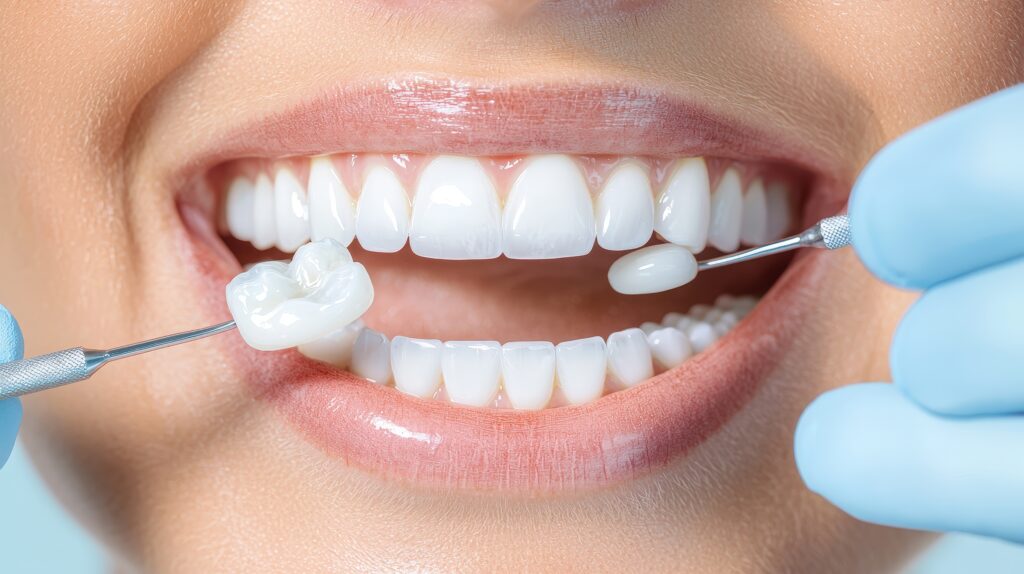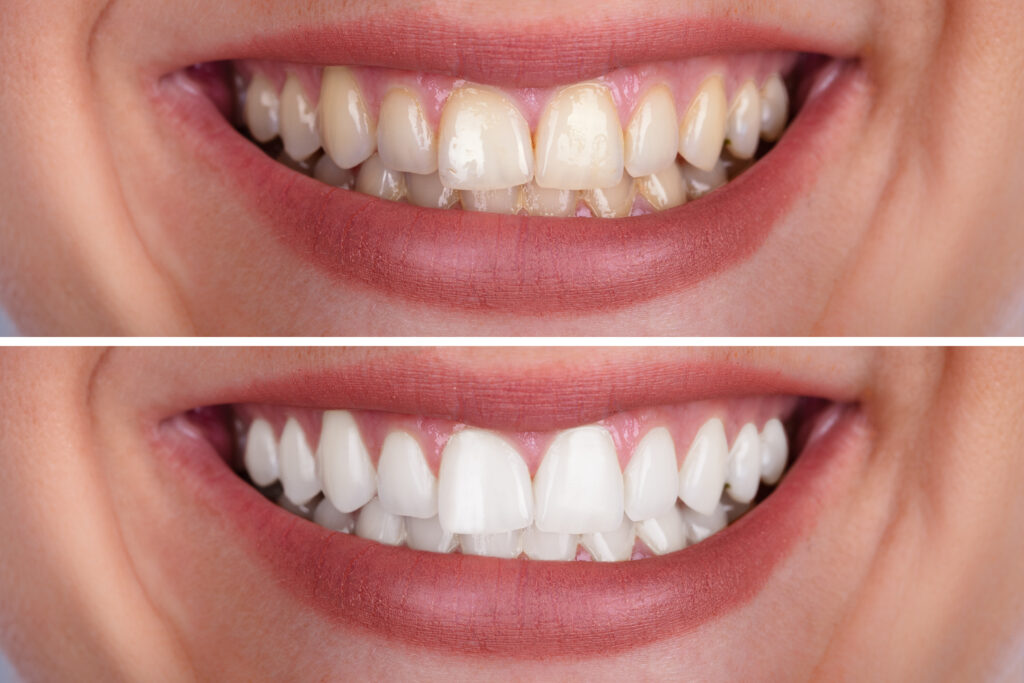
10 Apr Top 10 Tips For Maintaining Great Veneers
Getting dental veneers is a brilliant way to enhance your smile, offering a straight, bright, and natural-looking finish that many people aspire to. In recent years, veneers have become increasingly popular across the UK—not just among celebrities, but also among everyday people looking to boost their confidence and achieve a smile they can be proud of. Whether you’ve chosen porcelain veneers for their stain resistance and durability, or composite veneers for their affordability and quicker application, one thing remains true: veneers are an investment in both your appearance and self-esteem. However, that investment doesn’t end once you walk out of the dental clinic. Veneers, while long-lasting and incredibly effective, aren’t indestructible. They’re designed to mimic the look and function of natural teeth, which means they need just as much—if not more—attention and care. Without proper maintenance, veneers can chip, discolour, or even fail prematurely, costing you more in the long run and potentially impacting your oral health. Caring for your veneers is about more than aesthetics; it’s about ensuring they remain functional, comfortable, and hygienic. If you’re based in the UK and want your veneers to look great for years to come, incorporating consistent oral hygiene practices and making a few small lifestyle adjustments can make all the difference. In the following guide, we’ll walk through ten essential tips to help you preserve your veneers and keep your smile looking as flawless as the day you got them.
1. Brush Twice a Day—But Be Gentle
Good oral hygiene is the cornerstone of veneer maintenance, and brushing twice daily is non-negotiable. However, the way you brush matters just as much as how often. Using a soft-bristled toothbrush helps protect the enamel of your natural teeth and the surface of your veneers. Hard-bristled brushes can be abrasive, potentially dulling the polish on your veneers and irritating your gums. When it comes to toothpaste, it’s essential to choose one that’s non-abrasive. Some whitening toothpastes contain gritty ingredients meant to scrub stains from natural enamel, but these can be too harsh on veneers. A fluoride toothpaste recommended by your dentist will not only strengthen the remaining tooth structure behind the veneer but will also keep the surrounding teeth healthy. Take your time while brushing—use circular motions and avoid aggressive scrubbing. Think of it as gently polishing fine china, not scrubbing a burnt pan.
2. Don’t Skip Flossing—It’s More Important Than You Think
Flossing is often overlooked, especially by those who feel their teeth are already “perfect” thanks to cosmetic treatments. But veneers don’t protect against gum disease or decay between teeth. Food particles and plaque can easily build up in the crevices between your teeth and along the gumline, especially where veneers meet your natural tooth. Daily flossing keeps your gums healthy and helps prevent decay from forming in the areas that your brush can’t reach. This is crucial because decay around the edges of veneers can cause them to fail prematurely. Waxed dental floss or tape is often gentler and easier to use around veneers, but your dentist or hygienist can recommend what’s best for you based on your mouth’s specific needs. If traditional flossing feels awkward, you might consider a water flosser, which is a gentle and effective alternative.
3. Use an Alcohol-Free Mouthwash
Mouthwash can be a great addition to your daily routine, particularly if you want to maintain fresh breath and fight off bacteria that brushing and flossing might miss. However, not all mouthwashes are created equal, and when you have veneers, you need to choose one that’s alcohol-free. Alcohol-based rinses can dry out your mouth, and over time, may weaken the bonding materials used to hold veneers in place. Opt for a mild, alcohol-free formula with antibacterial properties. This will help keep your breath fresh, reduce plaque build-up, and support overall oral health—all without compromising the integrity of your veneers. Using mouthwash in the evening, after brushing and flossing, is usually the most effective time to let its protective benefits last overnight.
4. Be Aware of What You Bite Into
One of the quickest ways to damage veneers is through careless biting. Veneers, especially porcelain ones, are strong but can chip or crack under pressure. Avoid using your teeth to open packages, tear tape, or bite into extremely hard items. Chewing ice, munching on boiled sweets, or biting your fingernails are all habits that should be avoided. If you’re someone who loves crusty baguettes or hard granola bars, consider cutting them into smaller pieces instead of biting straight in. While veneers are made to withstand normal chewing forces, they aren’t designed to be tools or nutcrackers. Treat them with the same care you would give a fragile object—because once damaged, they often need to be replaced entirely.
5. Skip the Stain-Causing Foods and Drinks (When You Can)
One of the reasons people opt for veneers is the bright, white finish they provide. But that pristine look can become dulled over time if you frequently consume dark-coloured drinks and foods. Coffee, tea, red wine, soy sauce, balsamic vinegar, and even some berries can gradually cause discolouration—not necessarily on the veneer itself, but around the edges and on surrounding teeth. While porcelain veneers are highly stain-resistant, composite ones are more porous and can absorb colours more easily. That said, even porcelain veneers aren’t totally immune to staining along the gumline or between teeth. Limiting your intake of these items—or at least drinking through a straw when possible—can help minimise contact with your teeth. Rinsing your mouth with water after consuming such foods or drinks also helps reduce their staining impact.
6. Quit Smoking (Or At Least Cut Back)
Nicotine and tar are notorious for staining teeth and veneers alike. Over time, smoking can lead to yellowing, not just of natural enamel but also of veneer surfaces—especially composites. More importantly, smoking is harmful to your gum health, and compromised gums can affect how your veneers sit and how long they last. Gum recession caused by smoking can also lead to unsightly gaps between your veneers and your gumline, exposing the underlying tooth and potentially leading to decay or detachment. If you’ve recently invested in veneers, it might be the perfect motivation to finally cut back on or quit smoking altogether. Not only will your veneers stay looking fresher longer, but your overall oral and general health will also benefit significantly.
7. Get a Mouthguard If You Grind or Clench
Bruxism, the medical term for grinding or clenching your teeth, is more common than many realise—especially during sleep. This unconscious habit places enormous pressure on teeth, and veneers are no exception. Grinding can lead to cracks, chips, or dislodging of the veneer from the tooth. If your dentist suspects you might be grinding—either based on wear patterns or because you wake up with sore jaws—they’ll likely recommend a custom night guard. This protective appliance cushions your teeth while you sleep and significantly extends the life of your veneers. Think of it as protective gear for your investment. Off-the-shelf options exist but are often bulkier and less effective. Custom-fitted guards made by your dentist are far more comfortable and tailored to your specific bite.
8. Schedule Regular Check-Ups and Professional Cleanings
Just because you’ve improved the cosmetic appearance of your teeth doesn’t mean you can skip your dental appointments. In fact, regular dental check-ups are more important than ever once you have veneers. During these visits, your dentist will examine the health of your gums, check for any signs of damage to the veneers, and ensure the adhesive is still strong. Professional cleanings remove plaque and tartar build-up that even the most diligent home care can miss. Hygienists are trained to clean around veneers without damaging them, using specific tools and techniques. Ideally, you should be visiting your dentist every six months, though they might suggest a different schedule depending on your oral health. These visits are also a good opportunity to ask for personalised advice on any concerns you may have, from sensitivity issues to changes in appearance.
9. Listen to Your Dentist’s Aftercare Instructions
It’s easy to tune out after the big “reveal” when your veneers are first placed, but what your dentist tells you in those final minutes of your appointment is incredibly important. They’ll likely offer specific guidance on how to care for your new veneers based on the material used, your bite, and any existing dental issues you may have. Some patients may need to switch to a specialised fluoride toothpaste, especially if they’re prone to sensitivity or decay. Others may be advised to come in more frequently for cleaning or wear a night guard from day one. The key here is to follow the plan laid out for you rather than relying solely on generic advice. If you ever forget the instructions, don’t hesitate to give your dentist’s office a call. They’d much rather you ask than unknowingly damage your veneers.
10. Treat Your Veneers Like a Long-Term Investment
Veneers can last 10 to 15 years—or even longer with the right care. But just like any other investment, you have to maintain them. This means being proactive about your oral hygiene, making lifestyle adjustments, and staying committed to your dental health. It’s helpful to think of veneers as you would a luxury item, like a designer handbag or a premium car. They need regular upkeep, the right cleaning products, and careful handling to stay in good shape. But unlike those items, your veneers are with you all day, every day. You use them to eat, speak, and smile—so taking care of them isn’t just about vanity; it’s about functionality, comfort, and confidence.
Final Thoughts: A Smile That Lasts
A beautiful smile doesn’t end at the dentist’s chair—it’s something you actively maintain through the choices and habits you adopt every day. While getting veneers is a fantastic step towards achieving the smile you’ve always wanted, keeping that smile looking flawless requires consistent care. Brushing twice a day with a soft-bristled toothbrush, flossing regularly to remove plaque, and choosing oral products that are gentle on your veneers all play a critical role in preserving their appearance and function. But it’s not just about hygiene; being mindful of everyday habits—like avoiding hard foods, cutting back on staining drinks, and not using your teeth as tools—can significantly extend the life of your veneers. Veneers are designed to be long-lasting, but they’re not invincible. The small actions you take every day add up over time. That’s why working in partnership with your dentist is one of the smartest moves you can make. Regular check-ups, professional cleanings, and tailored advice will help you catch potential problems early and adjust your care routine as needed. Don’t wait until something goes wrong—proactive care is always easier and more affordable than repairs. Whether you’re based in London, Manchester, Cardiff, Glasgow, or a small town in Somerset, one thing remains true: great veneer care is rooted in consistency, awareness, and professional support. Protect your smile, and it will continue to light up not only rooms but also your confidence—for many years to come.
Contact the experts at Hendford Dental Practice today.





Sorry, the comment form is closed at this time.